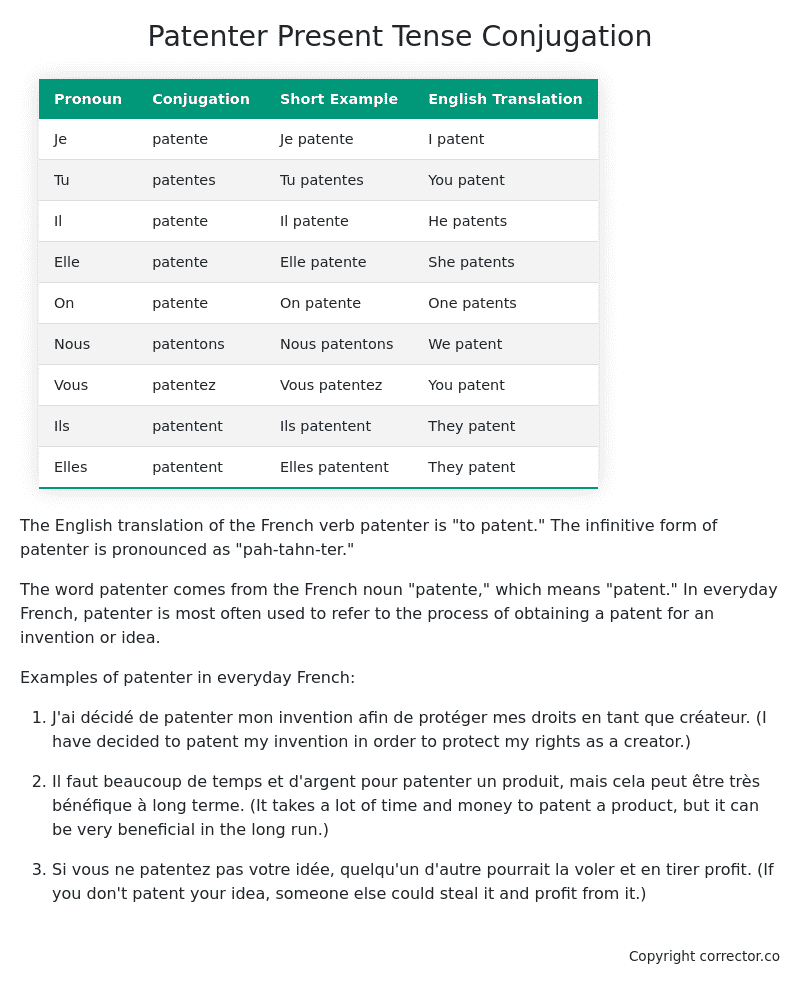Le Present (Present Tense) Conjugation of the French Verb patenter
Introduction to the verb patenter
The English translation of the French verb patenter is “to patent.” The infinitive form of patenter is pronounced as “pah-tahn-ter.”
The word patenter comes from the French noun “patente,” which means “patent.” In everyday French, patenter is most often used to refer to the process of obtaining a patent for an invention or idea.
Examples of patenter in everyday French:
-
J’ai décidé de patenter mon invention afin de protéger mes droits en tant que créateur. (I have decided to patent my invention in order to protect my rights as a creator.)
-
Il faut beaucoup de temps et d’argent pour patenter un produit, mais cela peut être très bénéfique à long terme. (It takes a lot of time and money to patent a product, but it can be very beneficial in the long run.)
-
Si vous ne patentez pas votre idée, quelqu’un d’autre pourrait la voler et en tirer profit. (If you don’t patent your idea, someone else could steal it and profit from it.)
Patenter – About the French Present Tense
To take a deep dive into all the French tenses then see our article on Mastering French Tense Conjugation.
Common Everyday Usage Patterns For Le Present
Interactions with Other Tenses
Table of the Present Tense Conjugation of patenter
| Pronoun | Conjugation | Short Example | English Translation |
|---|---|---|---|
| Je | patente | Je patente | I patent |
| Tu | patentes | Tu patentes | You patent |
| Il | patente | Il patente | He patents |
| Elle | patente | Elle patente | She patents |
| On | patente | On patente | One patents |
| Nous | patentons | Nous patentons | We patent |
| Vous | patentez | Vous patentez | You patent |
| Ils | patentent | Ils patentent | They patent |
| Elles | patentent | Elles patentent | They patent |
Other Conjugations for Patenter.
Le Present (Present Tense) Conjugation of the French Verb patenter (this article)
Imparfait (Imperfect) Tense Conjugation of the French Verb patenter
Passé Simple (Simple Past) Tense Conjugation of the French Verb patenter
Passé Composé (Present Perfect) Tense Conjugation of the French Verb patenter
Futur Simple (Simple Future) Tense Conjugation of the French Verb patenter
Futur Proche (Near Future) Tense Conjugation of the French Verb patenter
Plus-que-parfait (Pluperfect) Tense Conjugation of the French Verb patenter
Passé Antérieur (Past Anterior) Tense Conjugation of the French Verb patenter
Futur Antérieur (Future Anterior) Tense Conjugation of the French Verb patenter
Subjonctif Présent (Subjunctive Present) Tense Conjugation of the French Verb patenter
Subjonctif Passé (Subjunctive Past) Tense Conjugation of the French Verb patenter
Subjonctif Imparfait (Subjunctive Imperfect) Tense Conjugation of the French Verb patenter
Subjonctif Plus-que-parfait (Subjunctive Pluperfect) Tense Conjugation of the French Verb patenter
Conditionnel Présent (Conditional Present) Tense Conjugation of the French Verb patenter
Conditionnel Passé (Conditional Past) Tense Conjugation of the French Verb patenter
L’impératif Présent (Imperative Present) Tense Conjugation of the French Verb patenter
L’infinitif Présent (Infinitive Present) Tense Conjugation of the French Verb patenter
Struggling with French verbs or the language in general? Why not use our free French Grammar Checker – no registration required!
Get a FREE Download Study Sheet of this Conjugation 🔥
Simply right click the image below, click “save image” and get your free reference for the patenter Present Tense tense conjugation!

I hope you enjoyed this article on the verb patenter. Still in a learning mood? Check out another TOTALLY random French verb present conjugation!


